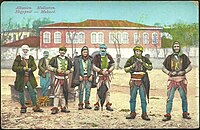Spata family
| Spata Spatas, Shpata | |
|---|---|
| Noble house | |
 | |
| Founded | 1358 |
| Founder | John Spata |
| Titles | conte (count), despot |
| Estate(s) |
|
| Part of a series on |
| Albanian tribes |
|---|
 |
The Spata family (Albanian: Shpata, Greek: Σπάτα, Σπάτας) was an Albanian noble family active in the 14th, 15th and 16th centuries, initially as Venetian vassals and later as Ottoman vassals. The family's progenitors were the brothers John Spata and Sgouros Spata.
The name "Spata" is derived from the Latin word spatha,[1] which itself derives from the Greek word σπάθη (spáthē), meaning "any broad blade, of wood or metal" but also "broad blade of a sword".[2][3] The word is found in Albanian as shpatë meaning "sword".
In the first half of the 14th century, mercenaries, raiders and migrants known in Greek as Άλβανοί (Albanoi or "Albanians") flooded into Greece (specifically raiding Thessaly in 1325 and 1334).[4] In 1358, Albanians overran the regions of Epirus, Acarnania and Aetolia and established two principalities under their leaders, John Spata and Peter Losha.[5] Naupactus (Lepanto) was later taken in 1378.[5] The Spata family frequently collaborated with Ottomans and saw them as protectors of the Spata family.[6]
Although German historian Karl Hopf provided a genealogy of the Spata family, it is deemed by modern scholarship as "altogether inaccurate".[7]
- John Spata, recognized as a ruler in Epirus and Aetolia by Simeon Uroš in 1359–1360.[8]
- who married Esau de' Buondelmonti, the Despot of Ioannina, in 1396.[7]
- An unnamed daughter who married John Zenevisi.
- Unclear
- Maurice Spata (fl. 1399–1414)
- Yaqub Spata (fl. 1414–1416)
- Sgouros Spata (fl. 1399–d. 1403)
- Paul Spata, Ottoman vassal
The Spata family was not kin (blood relatives) with the later Bua family.[9]
References[]
Citations[]
- ^ spatha, Charlton T. Lewis, Charles Short, A Latin Dictionary, on Perseus Digital Library
- ^ σπάθη, Henry George Liddell, Robert Scott, A Greek-English Lexicon, on Perseus Digital Library
- ^ Aleksić 2007, pp. 9ff.
- ^ Hammond 1976, pp. 39, 57.
- ^ a b Hammond 1976, p. 59.
- ^ Imber, Colin (1990). The Ottoman empire: 1300-1481. Isis. p. 113. ISBN 978-975-428-015-9.
The Spata clan, however, continued to see the Ottomans as their protectors.
- ^ a b Luttrell 1982, p. 122.
- ^ Madgearu & Gordon 2008, p. 83: "The despots Gjin Buia Spata and Peter Liosha were recognized by Symeon Uroš in 1359–1360 as rulers in Epirus and Aetolia. Albanian historians consider Gjin (or Ghinu) Buia and Peter Liosha Albanian, but it is sure that at least the Buia family was of Aromanian origin..."
- ^ Schirò 1971–1972, p. 81.
Sources[]
- Aleksić, Marko (2007). Mediaeval Swords from Southeastern Europe: Material from 12th to 15th Century. Belgrade: Marko Aleksić. GGKEY:UJ4HA53C8R7.
- Hammond, Nicholas Geoffrey Lemprière (1976). Migrations and Invasions in Greece and Adjacent Areas. Park Ridge, NJ: Noyes Press. ISBN 0-8155-5047-2.
- Luttrell, Anthony (1982). Latin and Greece: The Hospitallers and the Crusades, 1291–1440. London: Ashgate Publishing Limited. ISBN 978-0-86078-106-6.
- Madgearu, Alexandru; Gordon, Martin (2008). The Wars of the Balkan Peninsula: Their Medieval Origins. Lanham, MD: Scarecrow Press. ISBN 978-0-8108-5846-6.
- Pipa, Arshi (1978). Albanian Folk Verse: Structure and Genre. Munich: Trofenik. ISBN 978-3-87-828119-1.
- Schirò, Giuseppe (1971–1972). "La genealogia degli Spata tra il XIV e XV sec. E due Bua sconosciuti". Rivista di Studi Bizantini e Neoellenici. 28–29: 67–85.
- Spata family